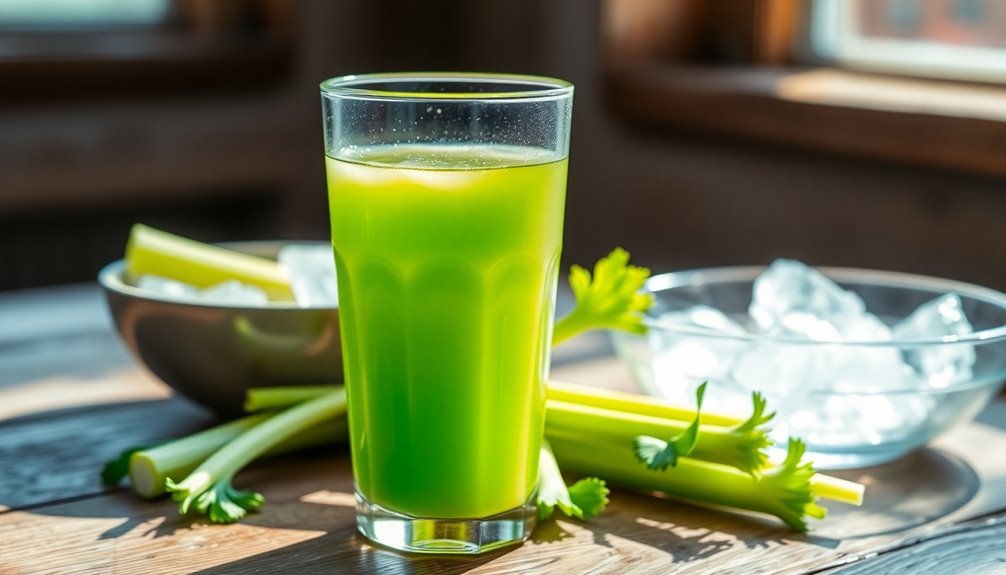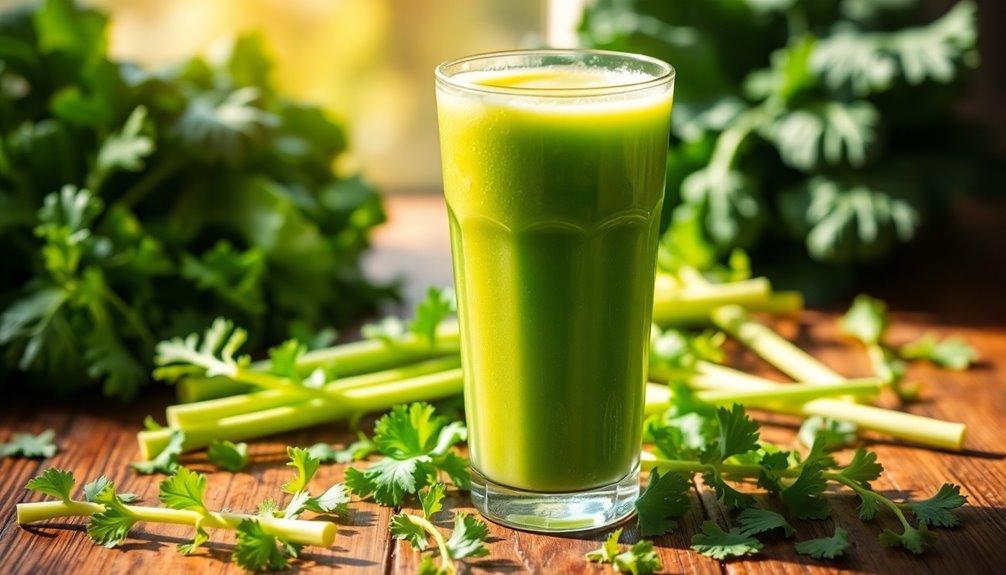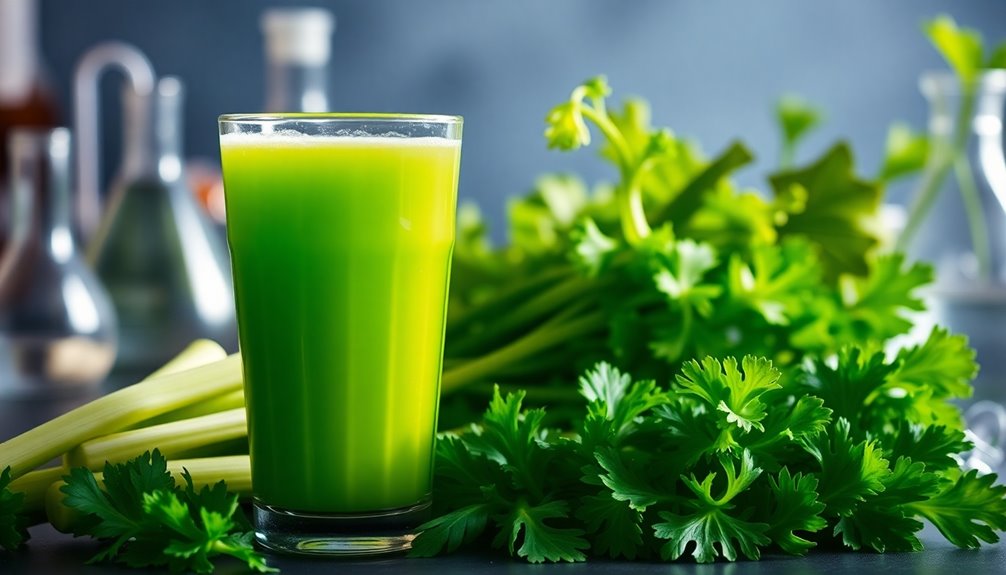Yes, celery juice is healthy! It's about 95% water, keeping you hydrated while delivering essential vitamins like C and K. With only 3 grams of sugar per cup, it helps regulate blood sugar levels too. Plus, it's packed with antioxidants that fight inflammation and chronic diseases. However, it lacks fiber, which can affect digestion. If you're curious about how to make the most of celery juice and its benefits, there's even more to explore!
Key Takeaways
- Celery juice is highly hydrating, containing 95% water, essential for maintaining skin health and bodily functions.
- It offers crucial nutrients, including 781 mg of potassium and 10 mg of Vitamin C per cup, supporting muscle function and immune health.
- The juice boasts anti-inflammatory properties and contains at least 12 antioxidants, which help combat oxidative stress and reduce disease risk.
- With only 3 grams of sugar per cup and a low glycemic index, celery juice aids in blood sugar stabilization.
- However, its low fiber content may cause digestive issues, making balanced consumption important for overall health.
Hydrating Benefits of Celery Juice

When you sip on celery juice, you're not just enjoying a revitalizing drink; you're also hydrating your body with a beverage that's about 95% water. This high water content offers impressive hydrating benefits, making celery juice a perfect choice for those looking to enhance their overall hydration.
With only 3 grams of naturally occurring sugar, it's a low-sugar option that won't spike blood sugar levels, making it ideal for managing diabetes. Regular consumption supports healthy skin and optimal bodily functions.
Plus, celery juice provides essential electrolytes like potassium, which plays a vital role in maintaining fluid balance and muscle function. So, grab a glass and hydrate your way to better health!
Low Sugar Content and Blood Sugar Control

Celery juice stands out as an excellent choice for those concerned about sugar intake and blood sugar management, thanks to its remarkably low sugar content of just 3 grams per cup.
Its low glycemic index helps stabilize blood sugar levels, making it perfect for anyone managing diabetes or blood sugar concerns. The high water content, approximately 95%, aids in hydration, which is essential for maintaining ideal blood sugar levels.
Additionally, celery juice is rich in potassium, a mineral that helps regulate blood pressure and supports overall metabolic health.
While the fiber content in whole celery is often lost during juicing, the drink's nutritional benefits still promote blood sugar control, ensuring you stay refreshed and balanced throughout the day.
Anti-Inflammatory Properties and Antioxidants

Celery juice is packed with antioxidant compounds that help shield your body from oxidative stress.
By incorporating it into your diet, you may notice a reduction in inflammation, which can support overall health.
Its unique blend of nutrients not only combats inflammation but also boosts your immune function, making it a powerful addition to your wellness routine. Additionally, celery juice is known for its high water content, which aids hydration and supports skin health.
Antioxidant Compounds in Celery
While many vegetables offer health benefits, the impressive array of antioxidant compounds in celery truly stands out.
Celery juice is packed with at least 12 distinct antioxidants that combat free radicals and reduce oxidative stress.
Key compounds include:
- Flavonoids: These contribute considerably to celery's anti-inflammatory properties.
- Phenolic Acids: They play a crucial role in lowering the risk of chronic diseases.
- Luteolin: This specific flavonoid may help reduce inflammation, particularly in the gut.
- Potassium: Known for supporting cardiovascular health, it enhances the juice's antioxidant effects. Moreover, the antioxidant properties of celery can combat oxidative stress, similar to benefits observed in coffee.
Reducing Inflammation Effects
When it comes to reducing inflammation, the rich blend of antioxidants in celery juice plays an essential role. This powerhouse drink contains flavonoids and phthalides, which not only support gut health but also help lower blood pressure. Luteolin, a key antioxidant, can decrease gut inflammation, benefiting your overall inflammatory responses. Additionally, the polysaccharides in celery juice enhance digestive health, potentially minimizing gastrointestinal issues. By incorporating celery juice into your healthy diet, you may reduce the risk of chronic diseases thanks to its anti-inflammatory properties. Moreover, the detoxifying properties of celery juice further contribute to its ability to support overall wellness.
| Component | Benefits | Effects on Health |
|---|---|---|
| Antioxidants | Combat free radicals | Reduce oxidative stress |
| Flavonoids | Anti-inflammatory properties | Lower chronic disease risk |
| Phthalides | Relax blood vessels | Lower blood pressure |
Nutritional Value: Vitamins and Minerals

Packed with essential vitamins and minerals, celery juice offers a wealth of nutritional benefits in just a single serving. Its impressive nutritional value supports a healthy diet and enhances overall well-being.
Here are some key components:
- Vitamin K: Approximately 90 mcg per serving, providing 75% of the daily value for blood clotting and bone health.
- Folate: Contains around 110 mcg, accounting for 27% of the daily value, fundamental for cellular function and tissue growth.
- Potassium: Each cup delivers about 781 mg, critical for muscle function and blood pressure regulation.
- Vitamin C: Offers 10 mg, contributing 11% of the daily value, essential for immune function and skin health.
These minerals collectively enhance the health benefits of celery juice, making it a powerful addition to your diet.
The Role of Fiber in Gut Health

Celery juice is packed with nutrients, but it lacks one important component: fiber.
Fiber plays a vital role in gut health, promoting regular bowel movements and preventing constipation by adding bulk to your stool. When you juice celery, you lose most of its 1.6 grams of fiber per 100 grams, which could lead to digestive issues.
Dietary fiber also supports a healthy gut microbiome, acting as a prebiotic that feeds beneficial bacteria. A high-fiber diet is linked to a reduced risk of chronic diseases, including cardiovascular disease and type 2 diabetes.
Plus, fiber contributes to satiety, helping you feel fuller longer and preventing overeating. To reap these benefits, consider incorporating whole celery into your diet.
Debunking Myths: Celery Juice as a Cure-All

While many people tout celery juice as a miracle cure for various health issues, it's important to approach these claims with skepticism.
Here are some key points to evaluate:
- Claims of celery juice as a cure-all aren't scientifically supported.
- It offers hydration benefits and some anti-inflammatory properties, but that doesn't make it a miracle remedy.
- Registered dietitians stress the importance of a balanced diet rich in diverse nutrients rather than relying solely on a celery juice cleanse.
- The nutritional benefits of celery juice should complement, not replace, a healthy lifestyle.
Potential Downsides of Celery Juice

Although celery juice is often celebrated for its potential health benefits, it's important to evaluate the downsides that come with it. The low fiber content can lead to increased hunger and may foster excessive calorie restriction, risking nutritional deficiencies. Additionally, celery juice contains about 189 mg of sodium per cup, which could be a concern for those managing high blood pressure. Drinking it as part of detox cleanses might also result in fatigue and irritability due to lack of solid food. Furthermore, commercial versions could have added sugars, undermining the health benefits. Here's a quick look at some potential downsides:
| Downsides | Concerns | Alternatives |
|---|---|---|
| Low fiber content | May affect digestive health | Whole celery stalks |
| High sodium levels | Risk for high blood pressure | Fresh vegetable juices |
| Risk of nutritional deficiencies | Excessive calorie restriction | Balanced meals |
| Added sugars | Negate health benefits | Homemade celery juice |
| Detox cleanse risks | Fatigue and irritability | Nutrient-rich diets |
How to Incorporate Celery Juice Into Your Diet

Incorporating celery juice into your diet can be both easy and enjoyable.
Start your mornings with a revitalizing glass on an empty stomach, and experiment with adding flavors like green apple and lemon for variety.
You'll find that these simple changes can enhance both the taste and health benefits of your daily routine.
Daily Serving Suggestions
To enjoy the numerous health benefits of celery juice, aim for a daily serving of 16 ounces. This amount provides ideal hydration and essential nutrients.
Here are some suggestions to incorporate it into your routine:
- Drink it fresh: Consume freshly made celery juice immediately to maximize nutrient retention.
- Enhance the flavor: Add half a green apple or a tablespoon of lemon juice for extra vitamins.
- Pair with breakfast: Enjoy celery juice alongside a balanced breakfast of whole foods like oatmeal or eggs to meet your nutritional needs.
- Monitor sodium intake: Be mindful of your sodium intake, as celery juice contains about 189 mg per cup, which could affect those on salt-restricted diets.
- Consider folate intake: Including celery juice in your diet can contribute to your daily folate intake, which is especially important for reducing neural tube defects during pregnancy.
These tips will help you reap all the health benefits while enjoying your celery juice!
Recipe Ideas and Variations
While celery juice is nutritious on its own, you can easily elevate its flavor and health benefits by trying various recipes and combinations.
For an invigorating twist, blend celery with cucumber and mint to boost hydration. You can also add ginger or turmeric for an anti-inflammatory kick.
If you want a thicker texture, retain some of the pulp by not straining the juice completely, which helps incorporate fiber into your drink.
For a nutrient-dense breakfast, mix celery juice into smoothies with spinach, banana, and yogurt, and consider adding healthy fats like avocado.
Don't hesitate to experiment with flavors by incorporating half a green apple and a tablespoon of fresh lemon juice to balance sweetness and acidity! Additionally, adding essential oils like peppermint or ginger can enhance your drink's refreshing qualities and provide additional health benefits.
The Science Behind the Celery Juice Trend

As the celery juice trend continues to gain traction, it's essential to examine the science behind the claims fueling its popularity. While supporters tout numerous health benefits, scientific evidence remains lacking.
Here are some key points to reflect on:
- Celery juice contains antioxidants and anti-inflammatory compounds that may improve hydration.
- Some research suggests it could positively impact gut health due to compounds like luteolin.
- The juicing process removes fiber, reducing its digestive benefits compared to whole celery.
- Claims about "cluster salts" healing chronic illnesses lack scientific backing.
Frequently Asked Questions
What Happens to Your Body if You Drink Celery Juice Everyday?
If you drink celery juice every day, you might notice improved hydration and better skin health thanks to its antioxidants.
It can help reduce inflammation and support your gut health. You'll get essential vitamins and minerals, which are great for your bones and heart.
However, relying solely on it could leave you feeling hungry and lacking in other nutrients due to its low fiber content.
Balance is key for overall health!
Is There Any Science Behind Celery Juice?
If you think celery juice is a magical elixir that'll transform your health overnight, you might want to reconsider.
While some studies hint at compounds like luteolin potentially reducing gut inflammation, most research is limited to animals.
Plus, the health claims surrounding celery juice lack solid scientific backing.
It's far better to enjoy whole celery for its fiber and nutrients, alongside a balanced diet, rather than pinning all your hopes on this trendy drink.
Is Celery Juice Good for the Brain?
Yes, celery juice can be good for your brain. It contains luteolin, which may help reduce neuroinflammation and support brain health.
The antioxidants in celery juice, like vitamin C, combat oxidative stress linked to cognitive decline. Plus, its high water content keeps you hydrated, essential for peak brain function.
Regularly drinking celery juice might also improve blood circulation, enhancing oxygen delivery to your brain, which can further support cognitive health.
What Are Three Disadvantages of the Celery Juice Diet?
When you consider the celery juice diet, you'll notice several disadvantages.
First, it's low in fiber, which can leave you feeling hungrier and may lead to unhealthy eating habits.
Second, each cup contains sodium, which is a concern if you're on a salt-restricted diet.
Finally, it lacks essential nutrients, risking deficiencies and causing fatigue or irritability if relied upon too heavily.
Balancing your diet with whole foods is vital for overall health.
Conclusion
Incorporating celery juice into your diet can be like adding a revitalizing splash of green to your health routine. Its hydrating properties, low sugar content, and rich nutritional profile make it a fantastic choice for wellness. While it’s not a miracle cure, it offers impressive benefits, especially for gut health and inflammation. Just remember to enjoy it as part of a balanced diet, and you’ll reap the rewards of this trendy elixir! Additionally, many enthusiasts tout celery juice and weight loss benefits due to its low calorie content and ability to promote hydration, which can help curb cravings. The high fiber content can also aid digestion and support a healthy metabolism. By incorporating celery juice alongside regular exercise and mindful eating, you can enhance your journey towards optimal health and wellness.
Cindy thoroughly researches juicing trends, techniques, and recipes to provide readers with practical advice and inspiration. Her writing style is accessible, engaging, and designed to make complex concepts easy to understand. Cindy’s dedication to promoting the advantages of juicing shines through her work, empowering readers to make positive changes in their lives through the simple act of juicing.











